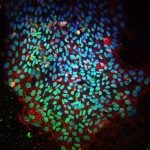Lien vers Pubmed [PMID] – 7679988
EMBO J. 1993 Feb;12(2):387-96
The ability of Escherichia coli DNA polymerase I to retrotranscribe an RNA template was examined under steady-state conditions, using a primer extension assay which allows determination of kinetic constants on well-defined heterogeneous sequences. Equilibrium and rate constants for the initial binding step of the enzyme to two homologous DNA and RNA templates do not show striking differences. In both cases, under steady-state conditions, processivity limits the maximal velocity of the translocation process. The lower catalytic efficiency of the enzyme when it operates on RNA is then reflected by a 100-fold greater apparent average Michaelis constant for the deoxynucleotide substrates. We conclude that E.coli DNA polymerase I effectively transcribes both templates, its performances being limited in both cases by its intrinsically low processivity. Furthermore, DNA polymerase I is a strikingly accurate enzyme when operating on RNA. Magnesium has to be substituted by manganese so that a pattern of errors could be detected. This great accuracy results from a combination of factors. The 3′ to 5′ exonuclease activity is still operating but in a non-discriminative manner. Elongation of a mismatched primer terminus is markedly impaired. The forward polymerization rate of incorporation of an incorrect deoxynucleotide must be extremely low, when Mg2+ is present. In summary E.coli DNA polymerase I preserves its main characteristics when retrotranscribing RNA.

